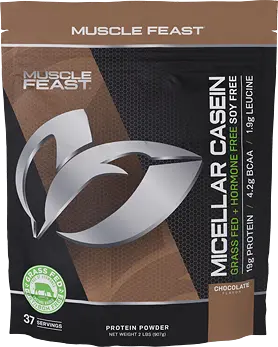Knowledge BaseYou're Questions Answered
Is casein protein powder good for you?
Casein protein powder is a popular supplement derived from milk. It is known for its slow-digesting properties, which provide a sustained release of amino acids into the bloodstream. This characteristic makes it a favored choice for certain dietary and fitness goals. Understanding the benefits and potential drawbacks of casein protein powder can help determine if it is a suitable choice for your dietary needs.
Benefits of Casein Protein Powder
1. Sustained Amino Acid Release
Casein protein forms a gel-like substance in the stomach, which slows down its digestion and absorption. This results in a prolonged release of amino acids into the bloodstream over several hours, making it an excellent option for providing a steady supply of protein during extended periods without food, such as overnight1.
2. Muscle Recovery and Growth
Casein protein is a complete protein, containing all nine essential amino acids necessary for muscle repair and growth. Its slow digestion rate supports muscle recovery by providing a continuous supply of amino acids, which can help prevent muscle protein breakdown2.
3. High-Quality Protein Source
Casein protein has a high biological value (BV), meaning it is efficiently utilized by the body for protein synthesis. This makes it an effective protein source for supporting overall health and fitness goals, particularly for muscle maintenance and development.
4. Satiety and Weight Management
The slow digestion of casein protein can promote feelings of fullness, which may aid in weight management by reducing overall calorie intake. Consuming casein protein as a part of a balanced diet can help support weight loss efforts while preserving lean muscle mass3.
Potential Drawbacks of Casein Protein Powder
1. Lactose Content
As a milk-derived protein, casein contains lactose, which may cause digestive discomfort for individuals with lactose intolerance. However, lactose-free casein options are available for those sensitive to lactose.
2. Allergy Considerations
Individuals with a milk allergy should avoid casein protein powder, as it can trigger allergic reactions. In such cases, alternative protein sources, such as plant-based or egg protein powders, may be more appropriate.
3. Slow Absorption Not Ideal for Post-Workout
While the slow absorption of casein protein is beneficial for sustained amino acid release, it may not be ideal for post-workout recovery, where a faster protein source like whey protein is generally preferred to quickly replenish amino acids.
- Boirie, Y., Dangin, M., Gachon, P., Vasson, M. P., Maubois, J. L., & Beaufrère, B. (1997). Slow and fast dietary proteins differently modulate postprandial protein accretion. Proceedings of the National Academy of Sciences, 94(26), 14930-14935.
- Phillips, S. M., & Van Loon, L. J. C. (2011). Dietary protein for athletes: From requirements to optimum adaptation. Journal of Sports Sciences, 29(sup1), S29-S38.
- Soenen, S., Martens, E. A., Hochstenbach-Waelen, A., Lemmens, S. G., & Westerterp-Plantenga, M. S. (2012). Normal protein intake is required for body weight loss and weight maintenance, and elevated protein intake for additional preservation of resting energy expenditure and fat free mass. Journal of Nutrition, 142(11), 1996-2003.
Related Questions

Your Answer
We are a participant in the Amazon Services LLC Associates Program, an affiliate advertising program designed to provide a means for us to earn fees by linking to Amazon.com and affiliated sites.






